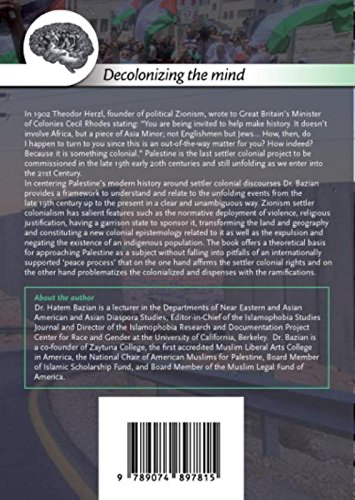Blog
The book by Hatem Bazian: Palestine… It is Something Colonial
Dr. Hatem Bazian writes in his book Palestine: It is Something Colonial that the occupation of Palestine was the British Empire's last settler-colonial undertaking, and it is still ongoing.
Authored by Yaqeen Institute
Published: December 30, 2022 •Jumada al-Thani 6, 1444
Updated: January 3, 2023 •Jumada al-Thani 10, 1444
Read time: 5 min
“You are being invited to take part in history-making,” said Theodor Herzl, the political Zionism movement's founder, in a letter to Cecil Rhodes, the British Minister of Colonies, in 1902. Instead of Africa, a portion of Asia Minor and Jews are involved rather than Englishmen.
“Since this is a non-urgent concern for you, how do I turn to you? How, exactly? because it is a colonial-era thing.”
Dr. Hatem Bazian has published and contributed to several books, including Erasing the Human: Collapse of the Postcolonial World and Refugee Immigration Crisis; The Revolution Will Not Be Funded: Beyond the Non-Profit Industrial Complex; and Annotations on Race, Colonialism, Islamophobia, Islam, and Palestine. His Ph.D. thesis was titled “Al-Quds in the Islamic Consciousness: A Textual Survey to Muslim Claims and Rights to the Sacred City” and contributed to a better understanding of Muslim attachment and informed political attitudes toward the sacred city of Jerusalem and Palestine in general. You can find Dr. Hatem Bazian on Twitter, Instagram, and Facebook; to follow his research and content to become better informed on the history of Palestine and its central role in global advocacy and liberation movements.
Muslims in America have supported the Palestinian cause for many years and are still supporting it today. Palestine is important to all Muslims because, according to their religion, it is a hallowed place. The Aqsa mosque is mentioned in the Holy Qur'an in verse 17:1:
سُبْحَـٰنَ ٱلَّذِىٓ أَسْرَىٰ بِعَبْدِهِۦ لَيْلًۭا مِّنَ ٱلْمَسْجِدِ ٱلْحَرَامِ إِلَى ٱلْمَسْجِدِ ٱلْأَقْصَا ٱلَّذِى بَـٰرَكْنَا حَوْلَهُۥ لِنُرِيَهُۥ مِنْ ءَايَـٰتِنَآ ۚ إِنَّهُۥ هُوَ ٱلسَّمِيعُ ٱلْبَصِير
Palestine is a land of blessings and prophethood and the home of the “second mosque.” Muslims used to pray toward the direction of Masjid Al-Aqsa before it was redirected to the Holy Kaa’ba after the hijra (migration) of the Prophetﷺ. Muslims are also responsible for assisting and uplifting their Palestinian brothers and sisters, who endure grave injustice daily. Due to the rights afforded to US citizens, including the ability to advocate, petition, and protest for justice, Muslims in America frequently feel a greater obligation to promote justice in Palestine. Muslims must act justly according to the teachings of Islam.
The book Palestine: It is Something Colonial was shared and reviewed in the American Journal of Islamic Social Sciences (AJIS) by Shelby Perez. She writes, “Hatem Bazian explores the roots of the conflict, locating the Zionist movement as a settler colonial project under the tutelage of British colonial efforts.” Bazian’s text is a look at and beyond first-hand accounts, an investigation of and critical analysis of settler practice about similar texts such as Sari Nusseibeh’s Once Upon a Country: A Palestinian Life, Alan Dowty’s Israel/Palestine, and Ari Shavit’s My Promised Land…
Instead of being something colonial, Palestine offers a profound criticism of British colonialism and the Zionist movement. It explores how Zionism absorbed colonial beliefs and methods and how British colonialism inspired Zionism. With the assistance of the United Kingdom and (later) the United States, Zionism historically planned and carried out the systematic eviction of Palestinians from their land. This movement is still active today, according to Bazian.
Bazian begins to look at the fall of the Ottoman Empire, the British colonization of Palestine, Israel's biblical theology of dispossession, the birth of Zionism during British colonial rule, Zionism as a Eurocentric epistem, the creation of Israel through ethnic cleansing, and the Nakba, all of which led to legalized dispossession. In the book, Bazian can connect each chapter to the current situation and remind the reader of the trauma experienced by people who were forcibly removed.
Bazian profoundly concludes his [sixth] chapter with the story of a Palestinian boy who witnessed the mass executions of men and women of his village and marched away from his home. The boy, now a man, closed his story with poignant words that capture the horror of the Nakba, “The road to Ramallah had become an open cemetery” (241). After the land was emptied, the new state of Israel needed to take possession of the Palestinian-owned property legally. Chapter seven, “Colonial Machination,” elaborates on this process: “the State of Israel is structured to give maximum attention to the fulfillment of the settler-colonial project, and the state apparatus is directed toward achieving this criminal enterprise” (243). The name “Palestine” is erased as a name for people and the peoples; former colonial and Ottoman laws were twisted to support a systematic theft of the land. Bazian concludes his book with a look to the future, “What is the way forward and Palestine’s de-colonial horizon?” (276).”
Disclaimer: The views, opinions, findings, and conclusions expressed in these papers and articles are strictly those of the authors. Furthermore, Yaqeen does not endorse any of the personal views of the authors on any platform. Our team is diverse on all fronts, allowing for constant, enriching dialogue that helps us produce high-quality research.
Want to appear on Yaqeen?


